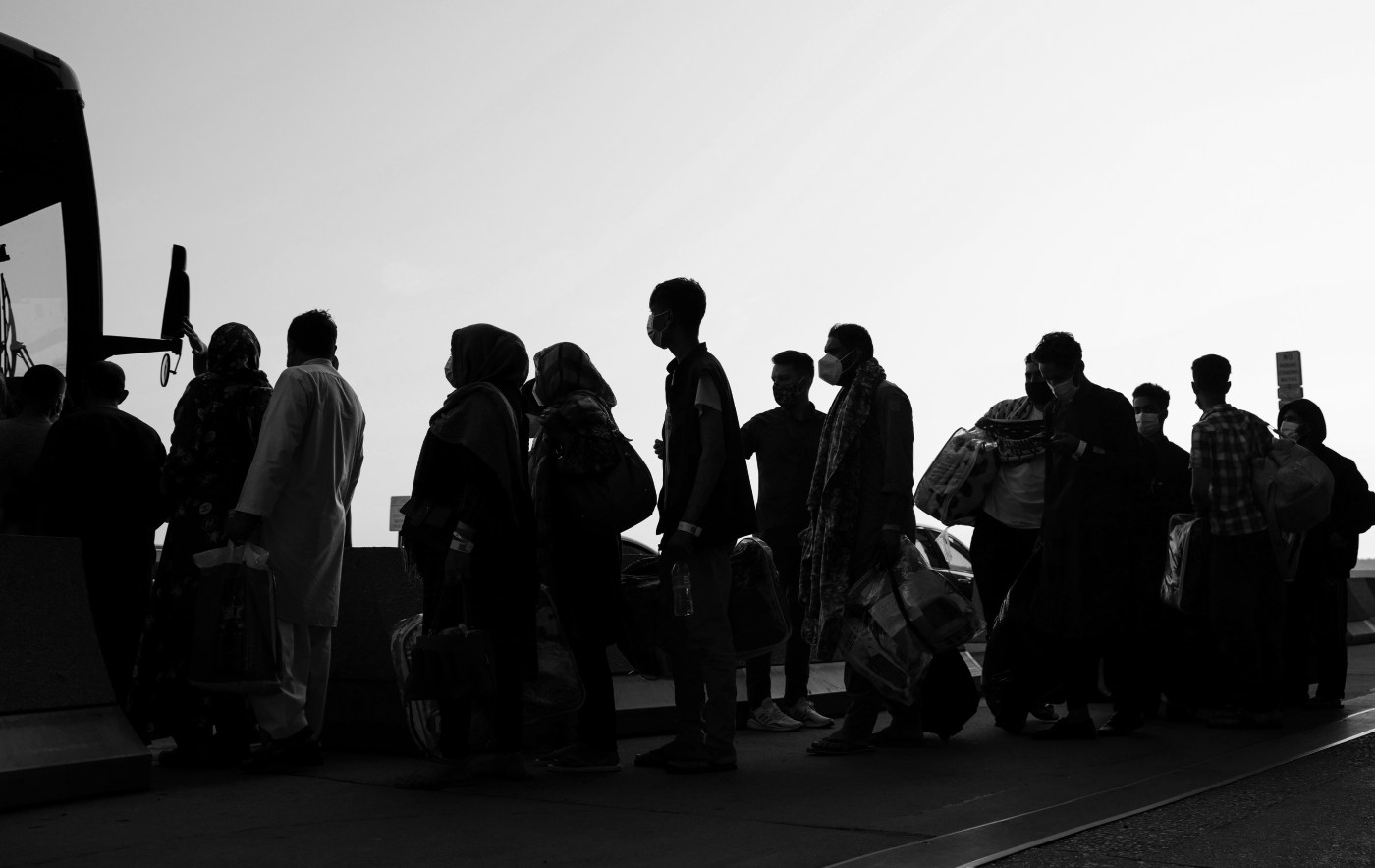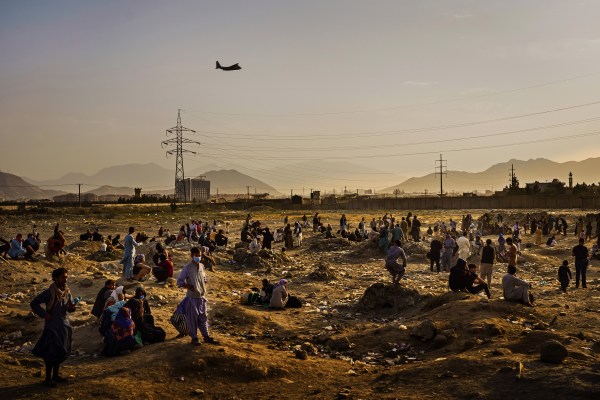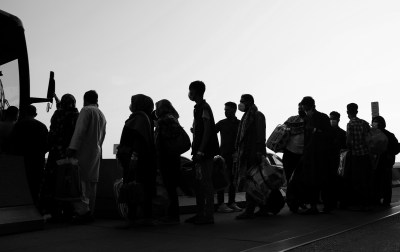Four years ago today, as America’s 20-year mission in Afghanistan neared its end, the city of Kabul fell to the Taliban. The next day, August 16, 2021, produced the most indelible images of America’s betrayal of Afghan civilians and allies, as cameras captured footage of desperate Afghans clinging to the side of American military aircraft taking off, and at least two Afghans fell to their deaths.
Over the following two chaotic weeks, tens of thousands of Afghans were evacuated from Kabul’s main airport, where 13 U.S. service members and about 170 Afghans were killed by a suicide bombing outside of an entrance to the facility known as Abbey Gate. But the majority of America’s Afghan allies, including interpreters and their families, were left behind.
That initial betrayal carried out under the Biden administration has endured—and in some respects has been exacerbated—under the Trump administration. While 195,000 Afghans have been resettled in the United States since Kabul fell to the Taliban, there are at least 250,000 Afghans abroad who are eligible for resettlement in the United States, including 167,000 applicants for Special Immigrant Visas (SIV), a program for Afghan allies and their family members.
The pace of U.S. government admitting vetted SIV applicants and their family members to the United States has slowed from 3,000 to 4,000 a month at the end of the Biden administration to 200 per month under the Trump administration, according to Jessica Bradley Rushing, a former State Department official who was laid off from her government post in July and now works at AfghanEvac, a nonprofit that helps Afghan allies and refugees. (Trump administration officials did not provide statistics in response to questions from The Dispatch about how many Afghans have been admitted to the country this year through Special Immigrant Visas.) Under the State Department program Enduring Welcome, the U.S. government was funding the relocation of Afghans, including by paying for commercial flights from Afghanistan to countries like Qatar, Albania, and the Philippines, but President Donald Trump’s executive order issued on January 20 cutting off foreign aid stopped that relocation funding. “Now that the U.S. government isn’t doing all the relocations, it’s dramatically slowed,” said Shawn VanDiver, a Navy veteran and the president of AfghanEvac. “The vast majority are in Afghanistan, but there are Afghans in 90 countries around the world waiting to come here.”
Even if funding were restored for relocation efforts, it would take an additional act of Congress for all SIV-eligible applicants to come to the United States. Congress has authorized only enough visas for roughly 40,000 of the 167,000 SIV-eligible applicants and their family members, according to AfghanEvac.
While SIV applicants continue to be processed, the Trump administration shut down the U.S. refugee program on January 27. That has affected Afghans who weren’t directly working for the United States but nevertheless face the threat of persecution from the Taliban based on things like their careers—working for Western-allied nonprofits or in academia, for instance—or religious faith. The situation is particularly dire for Afghans who fled to Pakistan and Iran, whose governments are actively deporting tens of thousands of Afghans back into the hands of the Taliban. Just 76 Afghan refugees have been admitted to the United States since January 20, an official for the Department of Homeland Security told The Dispatch.
Behind every statistic, of course, is a real human story. Justin Alexander Yousufpoor, who served as an Afghan interpreter for U.S. forces until his father was brutally murdered by the Taliban for working for the United States in 2010, told The Dispatch about his efforts to get his family to the United States.
Yousufpoor himself came to the United States on a Special Immigrant Visa in 2010 after his father’s murder. In 2012, he joined the U.S. Army, returned to Afghanistan as an interpreter, and became a U.S. citizen. Despite his father losing his life because of his work for the United States, Yousufpoor’s family remained stuck in Afghanistan until 2021. His mother and her children had a letter of recommendation provided by a brigadier general. While she and two of Yousufpoor’s siblings were able to evacuate from the Kabul airport, three of his siblings were unable to get inside the airport after the suicide bombing at Abbey Gate.
Within months of the fall of Afghanistan, Yousufpoor helped his sister flee to Pakistan, while his two brothers fled to Turkey. Four years later, the family has not been reunified—his sister’s application is still pending while his brothers are languishing in Turkey due to a perceived discrepancy over their birthdates. If returned to the Taliban, “they’re going to kill my brothers, or they’re going to recruit them to join the Taliban fighters,” Yousufpoor said. “If [my sister] is captured by the Taliban morale police or the intelligence, they’re going to immediately take her to the Taliban trial, and then she’s going to be prosecuted in public by stoning,” he added, explaining that before she fled the country his sister had been found guilty in Afghanistan for not wearing a head covering.
As for Afghans who have already made it to the United States, the Trump administration has made thousands vulnerable to deportation by revoking Temporary Protected Status and humanitarian parole for Afghans who arrived without legal status. This spring, thousands of Afghans received a letter from the Department of Homeland Security telling them that they would be “subject to potential criminal prosecution, civil fines, and penalties, and any other lawful options available to the federal government” if they did not immediately self-deport. Afghans who lost their protected status due to Trump administration policies can still apply for asylum. “We’ve heard there have been some denials of asylum cases, but in the vast majority, they’re being approved,” VanDiver told The Dispatch. “There’s no real pattern [to the denials], but I do think that people who crossed the southern border … are at a higher danger than those who came through other means.” A Department of Homeland Security official told The Dispatch that 1,841 Afghan nationals have been granted asylum since the start of the new Trump administration, but the official did not provide statistics on the number of asylum requests that have been denied.
One woman named Ashley, who was born and raised in the United States, spoke to The Dispatch about the plight of her brother-in-law—a Christian convert who fled Afghanistan because he feared for his life. Requesting not to use her last name due to fear of what would happen to her brother-in-law if he were returned to the Taliban, Ashley told The Dispatch that her brother-in-law crossed the southern U.S. border on January 11 of this year and approached border patrol agents requesting asylum. He has been held in detention since then, and on August 7, his request for “withholding for removal” was denied by an immigration judge. “There’s clearly a lack of belief in the severity of what it means to be a Christian in Afghanistan,” Ashley told The Dispatch.
Earlier this year, The Dispatch highlighted the case of Afghan Christians threatened with deportation at one church in Raleigh, North Carolina. Members of the church say the asylum hearings for those Afghan Christians have been repeatedly postponed.
VanDiver and other advocates say they are unaware of any Afghans in the United States who have been deported to Afghanistan. Chelsea Sobolik of World Relief, a Christian charity that operates worldwide, noted that the U.S. is unlikely to deport Afghans directly to Afghanistan because of a lack of diplomatic relations with the Taliban. But she warned that deporting Afghans to other countries would still endanger them. “The reality is, if we deported Afghans to Qatar or to any one of these third countries, they would likely deport those individuals back to Afghanistan,” she said. “It is not an overstatement to say that Afghan Christians, if returned, would certainly face torture or worse.”
As for the Afghan allies stranded overseas, VanDiver warned that remains a national security issue as well as a humanitarian issue. “These are all folks who, for one reason or another, served alongside our military or diplomats or intelligence services. They all took risks because they believed that the return on their investment—their risk investment—was going to be really high,” he said. “They thought they were going to be able to come and pursue their American dream, and instead, we’ve pulled the rug out from under them at every turn.”






Please note that we at The Dispatch hold ourselves, our work, and our commenters to a higher standard than other places on the internet. We welcome comments that foster genuine debate or discussion—including comments critical of us or our work—but responses that include ad hominem attacks on fellow Dispatch members or are intended to stoke fear and anger may be moderated.
With your membership, you only have the ability to comment on The Morning Dispatch articles. Consider upgrading to join the conversation everywhere.